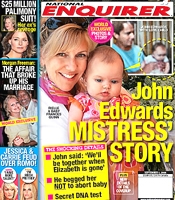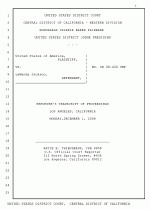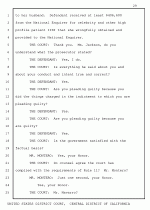Times Hails Enquirer Ethics
FBI still probing tab's purchase of celebrity medical records

View Document
MARCH 8--In chronicling the National Enquirer's latest bid for respectability, The New York Times today glowingly details the tabloid's sleuthing on the John Edwards trail (and the publication's related Pulitzer Prize bid). The newspaper also credits the Enquirer with a degree of ethical probity for which it is woefully unworthy.
In describing shoe leather efforts to confirm a tip that Rielle Hunter, Edwards's mistress, was pregnant, reporter Stephanie Clifford amusingly notes that "Enquirer reporters cannot pay off medical officials--they might be violating health care privacy laws."
We helpfully point Clifford to United States of America vs. Lawanda Jackson.
In that federal criminal prosecution, Jackson, who worked at the UCLA Medical Center, admitted taking payments from the Enquirer in return for periodically providing the tabloid with the confidential medical records of "celebrities and other high profile patients," according to this court transcript. Jackson, who copped in December 2008 to a felony charge, sold medical secrets to the Enquirer from early-2006 until mid-2007, when hospital officials discovered that she had been repeatedly breaking federal health privacy and security laws.
Among the many celebrities violated by the Jackson-Enquirer partnership was Farrah Fawcett (details of the actress's cancer treatment were illegally accessed by Jackson in April 2007 and sold to the Enquirer). Jackson, who died last March before she could be sentenced, banked about $5000 from the Enquirer. According to prosecutor Anthony Montero, Jackson "to hide her activities...arranged with the National Enquirer that her payments would be in the form of checks to her husband." This laundering, of course, shows evidence of guilt on the part of both payor and payee.
According to a source familiar with Jackson's prosecution, the former UCLA employee was thoroughly debriefed by FBI agents about her dealings with the Enquirer, where veteran reporter Patricia Shipp was the recipient of patient information sold by Jackson. The source added that investigators were focused on whether the tabloid had conspired with Jackson to violate federal privacy laws.
Thom Mrozek, a spokesman for the U.S. Attorney's Office in Los Angeles, today told TSG that there remains an "active, ongoing investigation" into Jackson's sale of patient information. With Jackson now dead a year, the Enquirer, it seems, would be the only remaining subject of that criminal inquiry. (4 pages)









